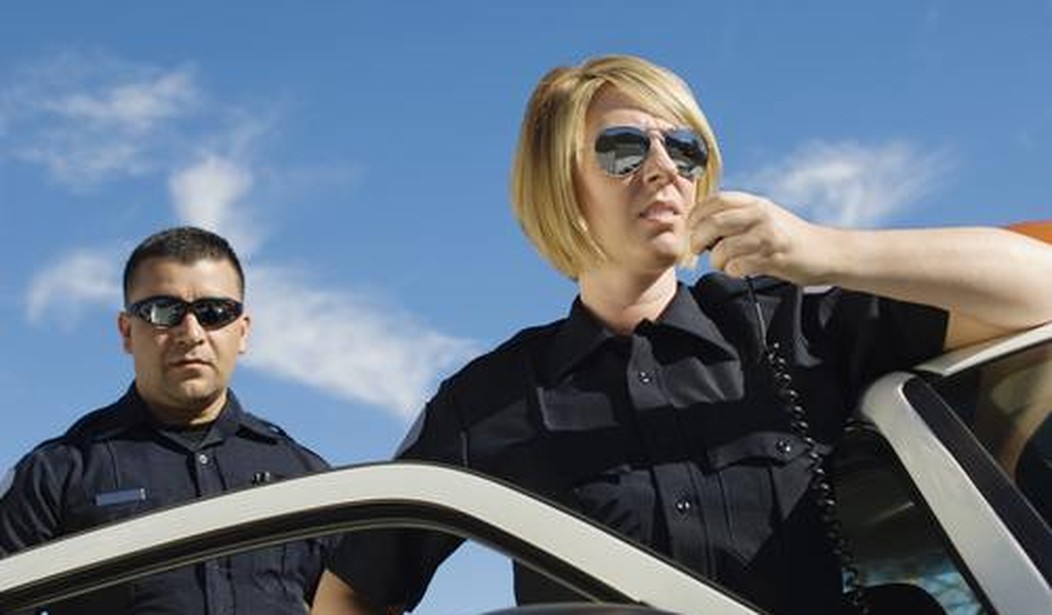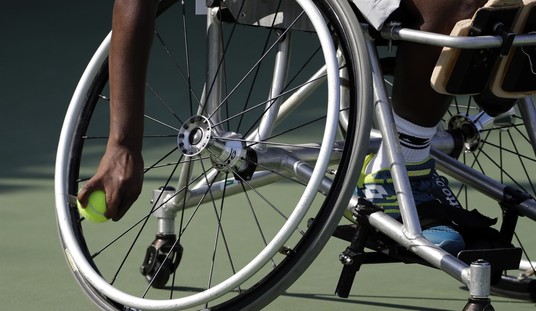Cops are racist. It doesn’t matter whether they intend to be or not. They are racist simply because they are cops. So goes the essential claim of the Black Lives Matter movement.
What makes cops racist according to Black Lives Matter? It doesn’t necessarily have anything to do with an individual officer’s intentions, beliefs, or specific actions. It has to do with their status as an agent of the capitalist system. Police act on behalf of those in power. Since those in power tend to be white male capitalists whose mere existence constitutes exploitation of poor minorities, police acting on their behalf prove inherently racist.
Here’s how political commentator and HuffPo Live host Marc Lamont Hill put it during a recent appearance on CNN:
To say that the Black Lives Matter movement is racist is bizarre to me, not just because black people don’t have the institutional power to be racist or to deploy racism, but because the movement has called for justice, it’s called for demilitarization, it’s called for nonviolence.
Note that bit in the middle, offered almost as a side note. “… black people don’t have the institutional power to be racist…” Hill thus conveys the radical leftist notion that racism is defined not by intentions, thoughts, or actions, but by the power dynamic. Cops are racist, even if they themselves are black, because they have power. That’s the fundamental premise upon which the entire Black Lives Matter movement is based.
With that established, let’s consider this profile of “the driving life and death of Philando Castile.” Presented as a straight news story by Minnesota Public Radio, the piece nonetheless suggests a particular narrative.
“[Castile] who was shot and killed by a police officer during a traffic stop in a St. Paul, Minn., suburb, was stopped by police 46 times and racked up more than $6,000 in fines,” they note. Castile was targeted not necessarily for being black, they imply, but for being poor:
The records show that Castile spent most of his driving life fighting tickets. Three months after that first stop, for example, his license was suspended and he went into his first spiral: Police stopped him on Jan. 8, 2003. They stopped him on Feb. 3 and on Feb. 12 and Feb. 26 and on March 4.
“What Mr. Castile symbolizes for a lot of us working in public defense is that driving offenses are typically just crimes of poverty,” says Erik Sandvick, a public defender in Ramsey County, which includes St. Paul and its suburbs.
[…]
Nicole Gonzalez Van Cleve, a professor in the Department of Criminal Justice at Temple University and the author of Crook County, which documents the problems in the criminal justice system of Chicago, said Castile was the “classic case” of what criminologists have called “net widening,” or the move by local authorities to criminalize more and more aspects of regular life.
“It is in particular a way that people of color and the poor are victimized on a daily basis,” Gonzalez Van Cleve said.
Many times, both Gonzalez Van Cleve and Sandvick agree, the system leaves citizens with no good choices — having to pick, for instance, whether to pay a fine or pay for car insurance.
Follow the narrative? It’s about power. “… people of color and the poor are victimized on a daily basis.” By what? By the existence and enforcement of laws.
By all accounts, Philando Castile was pulled over each of those 46 times for wholly legitimate reasons. Many of the stops appear to have been related to the suspension of his driver’s license. When your license gets suspended, a note to that effect gets flagged on your vehicle registration record. When a police officer runs your plate number, they will note that information, creating the reasonable suspicion that you may be driving illegally. That’s cause for a stop.
“I am just baffled, and I’ve been pulled over in the same vehicle my brother died in,” Castile’s sister said. Allyza Castile thinks it was her brother’s dreadlocks and the big sedans he loved to drive — like the Oldsmobile he was in — that made him stand out.
“I’ve been pulled over in that car for three or four times for the same exact reason — supposedly a broken taillight,” she said. “When you run the plates, his name comes up, so I’ve been harassed driving his vehicle myself. So I know that they harass my brother.”
Harassed? The officers making those stops were enforcing the law. What’s the alternative? Should we let people cruise around with busted tail lights and a suspended driver’s license?
That seems to be among the prescriptions of Black Lives Matter. A list of policy solutions offered by “Campaign Zero” includes an end to “broken windows policing,” defined as:
… policing minor crimes and activities… like sleeping in parks, possessing drugs, looking “suspicious” or having a mental health crisis.
While driving offenses are not specifically listed, the idea that “minor crimes and activities” prompt law enforcement to disproportionately target minorities and the poor has been echoed by the likes of Erik Sandvick and Nicole Gonzalez Van Cleve (quoted above). If the law treated such offenses with greater leniency, it might preclude encounters like the one that led to the death of Philando Castile.
Taken on their own, these ideas have some merit. Certainly, when you look at a case like that of Eric Garner, who died after an altercation with police prompted by the sale of loose cigarettes, an argument could be made for fewer laws and thus fewer pretexts for law enforcement to engage. That could lessen incidents of police-involved deaths. Certainly, the administration of municipal fines for minor infractions can prove draconian unless the ability to pay is taken into account.
But these ideas cannot be taken on their own merit, not when offered in the context of the Black Lives Matter movement and the broader Marxist project that it serves. Black Lives Matter and their Marxist supporters don’t want to trim a few laws here and tweak a few fines there. They want to abolish the established legal order. Black Lives Matter attorney Nana Gyamfi called for just that during an interview with a California radio station:
I see the police as part of the state and part of state sanctioned violence against our people, and so for me, I’m not concerned about blue lives, I’m concerned about black lives. In fact, I want the police to be abolished. I think we should be pushing the police out of our community. I think that we should be defunding the police. I think that we should be demilitarizing the police and finally dismantling the police.
If you dismantle the police, you effectively dismantle the state. We’re talking about anarchy here, a component of Marxist revolution. What would replace the police? Gyamfi tells us:
I suggest we keep order by doing what we did before we had the influx of crack cocaine and other ills that caused us to call the police in. There was a time when black people didn’t call police into the community… We had our own means in the community.
Those means are called street gangs. That’s what the privatization of rights protection looks like. If you don’t have cops, you don’t have laws. And when you don’t have laws, you’re made right by might. It’s the rule of the brute. Marxists like that, because they fancy themselves the brute. They want anarchy so they can inject a new order into the chaos.
Certain marginal reforms may be called for. A policy advocacy group in Minnesota with whom I am associated may soon suggest changes to how fines are administered, taking income into account, an idea arrived at independent of the race debate after one of my colleagues was pulled over. He’s white, in case you were wondering.
Regardless, until such reforms are implemented, it cannot be responsibly said that the police pull people over for being black or being poor. Police pull people over for breaking the law. In the final analysis, which remains some distance away, it may turn out that Philando Castile simply could not afford to drive legally. If so, that was his problem, not the cops’.








Join the conversation as a VIP Member